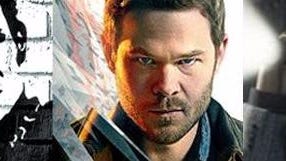Alan Wake: The Signal
The end is the beginning.
All this running brings Wake closer to the titular signal, which in practice is the same yellow mini-radar dot that was present throughout the original game. Without revealing whether Wake reaches the signal or not, I will say that nothing much happens on the way there. This episode serves as an exploration of character more than story. And as we delve deeper into Wake, he becomes even more of an unpleasant tool than before.
Wake is angry. When he's not feeling sorry for himself, he's sniping at every person - real or imagined - that he encounters. Dive-suit-wearing benefactor Thomas Zane makes a desperate effort to rescue Wake, and the writer responds, "This is bull****."
Later, agent and best friend Barry shows up and offers his thoughts on a floating-word puzzle. "I'm thinking the solution probably has something to do with those words," Barry says. "Really," Wake sneers, "Ya think?" That's a bit rich coming from Alan Wake, the ultimate stater of the obvious, a man who has graced us with such observations as, "The door was locked. I had to find a key to open the door."
Dude's in a bad way, plunging into a pitch-black madness, I get it. We're not catching him in his best moment. Still, Wake is worse than a flawed hero. He's a brat. And while the character has always been peevish, in the original game he at least showed an interest in solving the mystery of his missing wife. The Signal has a mystery, too - namely, what the damn hell is going on here? - but Wake doesn't care. He's too busy raging and kicking the ground to sort things out, leaving the hapless player to make sense of his metaphysical morass. I felt like grabbing Wake by his lapels and screaming, "Hey, pal, it's your freaking head we're stranded in. How about a little insight?"
Thank goodness for the genuinely funny Barry, who serves as a proxy for the player's more vengeful side by taunting and deriding Alan throughout the quest. In a sidelong way, Barry sometimes mocks the game itself, mostly by riffing on the fact that the thin plot makes practically no sense.
Too bad Barry isn't around to comment on The Signal's lowest moment, when Alan turns his torch toward the word "phone" and a heavily branded Verizon cell phone fills the screen. The product placement is embarrassing enough when the cinematic manages to show three Verizon logos in as many seconds. But when Zane's voice comes on the line to greet Alan with Verizon's advertising slogan - "Can you hear me now?" - dignity walks out the door and hails a cab. It's often hard to take The Signal seriously, and a gaffe like this doesn't help. [Editor's note: John's based in US. This advertising, for a US phone network, may not appear in the European version of The Signal.]
Amid its shortcomings, however, The Signal still has the formidable assets of its parent game: adult themes and a gorgeous visual style. The game explores the nature of language and creation with only fitful lucidity, but those patches of clarity are stirring. So I'd rather play an erratic instalment of Alan Wake than a highly polished cover-shooter clone, because even when it fails, the former gives me something to think about in the ensuing days. Put another way, The Signal gets better the more I don't play it.



